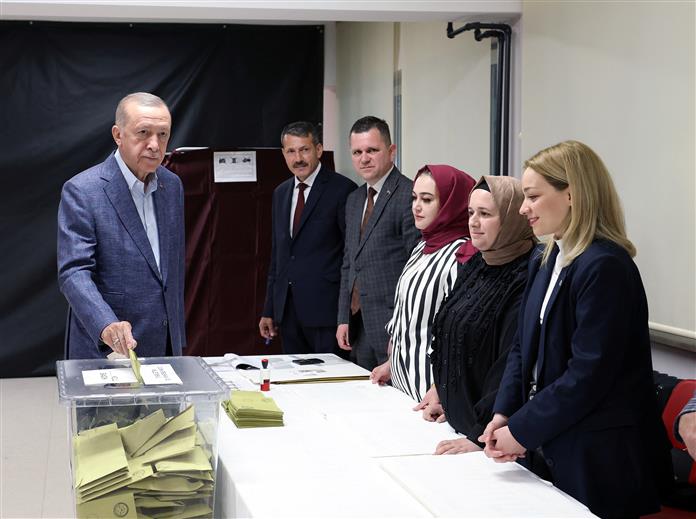
-
Published: 14 May 2023

State news agency.. Erdogan takes early lead in presidential election
Early returns from Turkey’s national election Sunday had President Recep Tayyip Erdogan with a solid lead after some 47% of ballot boxes were counted, the Turkish state-run news agency said, while the longtime leader’s main challenger disputed the numbers that showed him trailing.
Edited by| Paul Mitchel
Politic section - CJ journalist
ANKARA - May,14,2023
Erdogan, who has governed Turkey as either prime minister or president for two decades, had 52.2 of the vote from the partial count, compared to 41.9% garnered by opposition leader Kemal Kilicdaroglu, the Anadolu Agency reported.
In the run-up to the election, opinion surveys had indicated the increasingly authoritarian Erdogan narrowly trailed his challenger. The race had appeared to be shaping up as the toughest re-election bid of the Turkish leader’s 20-year rule of his NATO member nation.
With the partial results showing otherwise, members of Kilicdaroglu’s center-left, pro-secular Republican People’s Party, or CHP, disputed Anadolu’s numbers, contending the state-run agency was biased in Erodgan’s favor.
“We are ahead,” tweeted Kilicdaroglu, 74, who ran as the candidate of a six-party opposition alliance.
The election could grant Erdogan, 69, another five-year term or see him unseated by Kilicdaroglu, who campaigned on a promise to return Turkey to a more democratic path and to restore an economy battered by high inflation and currency devaluation.
If no candidate receives more than 50% of the vote, the winner will be determined in a May 28 run-off.
Voters also elected lawmakers to fill Turkey’s 600-seat parliament, which lost much of its legislative power under Erdogan’s executive presidency. If his political alliance wins, Erdogan could continue governing without much restriction. The opposition has promised to return Turkey’s governance system to a parliamentary democracy if it wins both the presidential and parliamentary ballots.
More than 64 million people, including 3.4 million overseas voters, were eligible to vote. This year marks 100 years since Turkey’s establishment as a republic — a modern, secular state born on the ashes of the Ottoman Empire.
Under Erdogan, Turkey has seen the suppression of freedom of expression and assembly. The country is wracked by a cost-of-living crisis that critics blame on the government’s mishandling of the economy. The president contends low interest rates tame inflation, and he pressured the central bank to reflect his view.
The latest official statistics put inflation at about 44%, down from around 86%. The price of vegetables became a campaign issue for the opposition, which used an onion as a symbol.
Turkey is also reeling from the effects of a powerful earthquake that caused devastation in 11 southern provinces in February, killing more than 50,000 people in unsafe buildings. Erdogan’s government has been criticized for its delayed and stunted response to the disaster, as well as a lax implementation of building codes that exacerbated the casualties and misery.
Internationally, the elections were seen as a test of a united opposition’s ability to dislodge a leader who has concentrated nearly all state powers in his hands and who has increasingly enjoyed influence on the world stage.
Erdogan, along with the United Nations, helped mediate a deal that has allowed Ukrainian grain to reach the rest of the world despite Russia’s war in Ukraine. The agreement is set to expire in days, and Turkey hosted talks last week to keep it alive.
In this election campaign, Erdogan used state resources and his domineering position over media to try to woo voters. He accused the opposition of colluding with “terrorists,” of being “drunkards” and of upholding LGBTQ+ rights, which he depicts as threatening traditional family values in the predominantly Muslim nation.
In a bid to secure support from citizens hit hard by inflation, he has increased wages and pensions and subsidized electricity and gas bills, while showcasing Turkey’s homegrown defense and infrastructure projects.
He also extended the political alliance of his ruling Justice and Development Party, or AKP, to include two nationalist parties, a small leftist party and two marginal Islamist parties.
Kilicdaroglu’s six-party Nation Alliance pledged to dismantle an executive presidential system narrowly voted in by a 2017 referendum. The opposition alliance also promised to restore the independence of the judiciary and the central bank and to reverse crackdowns on free speech and other forms of democratic backsliding under Erdogan.
The country’s main Kurdish political party, currently Turkey’s second-largest opposition grouping, is supporting Kilicdaroglu in the presidential race. Erdogan’s government in recent years has targeted the party’s leaders with arrests and lawsuits.
At polling stations, many voters struggled trying to fold bulky ballot papers — they featured 24 political parties competing for seats in parliament — and to fit them into envelopes along with the ballot for the presidency.
“We have all missed democracy so much. We all missed being together,” Kilicdaroglu said after voting at a school in Ankara, where his supporters chanted “President Kilicdaroglu!”
Erdogan said voting went ahead “without any problems,” including in the earthquake-affected region.
“It is my hope that after the evening’s count ... there will be a better future for our country, our nation and Turkish democracy,” Erdogan said.
Also running for president was Sinan Ogan, a former academic who has the backing of an anti-immigrant nationalist party.
In the 11 provinces affected by the earthquake, nearly 9 million people were eligible to vote. Some 3 million people left the quake zone for other provinces, but only 133,000 people registered to vote at their new locations.
In Diyarbakir, a Kurdish-majority city that was hit by the earthquake, Ramadan Akcay arrived early at his polling station to cast his vote.
“God willing it will be a democratic election,” he said. “May it be beneficial in the name of our country.”
